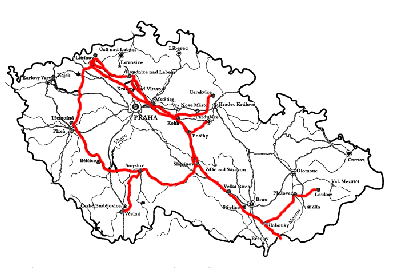![]()
We obtained very interesting information at the ČEPRO enterprise, which specialises in fuel transport all over the country. The name of the enterprise is a Czech abbreviation of Czech Oil Product Pipelines.
Car fuels are produced and consumed in vast amounts. The production in our country is concentrated into two refineries whereas the places of consumption are spread throughout the country. Part of the fuels is distributed directly from the refineries into outlets in their close vicinity while the prevalent part is distributed from the refinery reservoirs via a network of pipelines into individual storage sites, which are at the same time selling sites. This network has begun to be built before World War II but, for the most part, was being built after the war in accord with the rising fuel consumption. The network is illustrated in the enclosed map. The storage sites are equipped with below-ground or above-ground reservoirs for individual fuel types. From there, petrol tankers transport the fuels to petrol stations. The reservoirs vary in volume from 60 – 100 tonnes to 15 000 tonnes.
The storage sites are supplied by a single pipeline (200 – 500 mm inner diameter) through which different fuels are transported according to a schedule. Any change in the fuel type thus understandably causes a certain mixing – the formation of so-called "mixed columns". Each storage site has laboratories in which basic tests, such as density and viscosity measurements, are performed. The oil product pipelines are placed at a depth of 2 – 3 m below ground, and they traverse waterways on bridges.
The pipeline is electrochemically protected against corrosion using the "sacrificed electrode" principle. The pipeline is conductively connected with a metal or alloy plate, which has an electrode potential more negative than iron. The pipeline checks are conducted by placing into the pipeline a device called "the smart hedgehog" fitted with different sensors, which is taken along with the fuel stream. Regular checks are also carried out for possible fuel leakage. However, a more serious problem than anticorrosive protection is apparently protection against thieves who, apart from causing material damage, usually also cause environmental pollution. Elimination of these kinds of damage is also among the duties of the ČEPRO enterprise. The contaminated soil is removed and taken to special incineration plants. Another decontamination method includes the biological degradation of oil products.
According to legislative measures, fume recuperation had to be introduced at all gasoline-containing fuel storage sites beginning on 1 January 1998. This represented considerable investment costs for the enterprise. Some storage sites, which still lack the recuperation devices, are now used only for storing Diesel oil, which has a much lower vaporisation capacity.
